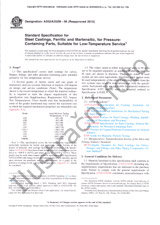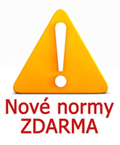Potřebujeme váš souhlas k využití jednotlivých dat, aby se vám mimo jiné mohly ukazovat informace týkající se vašich zájmů. Souhlas udělíte kliknutím na tlačítko „OK“.
ASTM E1781/E1781M-20
Standard Practice for Secondary Calibration of Acoustic Emission Sensors
Přeložit název
NORMA vydána dne 1.4.2020
Informace o normě:
Označení normy: ASTM E1781/E1781M-20
Datum vydání normy: 1.4.2020
Kód zboží: NS-991926
Počet stran: 8
Přibližná hmotnost: 24 g (0.05 liber)
Země: Americká technická norma
Kategorie: Technické normy ASTM
Kategorie - podobné normy:
Anotace textu normy ASTM E1781/E1781M-20 :
Keywords:
acoustic emission, acoustic emission sensor calibration, acoustic emission sensor secondary calibration, sensor calibration,, ICS Number Code 17.140.01 (Acoustic measurements and noise abatement in general)
Doplňující informace
| Significance and Use | ||||||||
|
4.1 The purpose of this practice is to enable the transfer of calibration from sensors that have been calibrated by primary calibration to other sensors. |
||||||||
| 1. Scope | ||||||||
|
1.1 This practice covers requirements for the secondary calibration of acoustic emission (AE) sensors. The secondary calibration yields the frequency response of a sensor to waves of the type normally encountered in acoustic emission work. The source producing the signal used for the calibration is mounted on the same surface of the test block as the sensor under testing (SUT). Rayleigh waves are dominant under these conditions; the calibration results represent primarily the sensor's sensitivity to Rayleigh waves. The sensitivity of the sensor is determined for excitation within the range of 100 kHz to 1 MHz. Sensitivity values are usually determined at frequencies approximately 10 kHz apart. The units of the calibration are volts per unit of mechanical input (displacement, velocity, or acceleration). 1.2 Units—The values stated in either SI units or inch-pound units are to be regarded separately as standard. The values stated in each system are not necessarily exact equivalents; therefore, to ensure conformance with the standard, each system shall be used independently of the other, and values from the two systems shall not be combined. 1.3 This standard does not purport to address all of the safety concerns, if any, associated with its use. It is the responsibility of the user of this standard to establish appropriate safety, health, and environmental practices and determine the applicability of regulatory limitations prior to use. 1.4 This international standard was developed in accordance with internationally recognized principles on standardization established in the Decision on Principles for the Development of International Standards, Guides and Recommendations issued by the World Trade Organization Technical Barriers to Trade (TBT) Committee. |
||||||||
| 2. Referenced Documents | ||||||||
|
Odebírejte informace o nově vydaných normách ZDARMA:
Chcete pravidelně odebírat informace o nově vycházejících normách z celého světa a to zcela zdarma?
Přihlašte se k odběru. Vše je velice jednoduché a absolutně ZDARMA.
Na výběr máte vydavatele z celého světa.




 Cookies
Cookies
